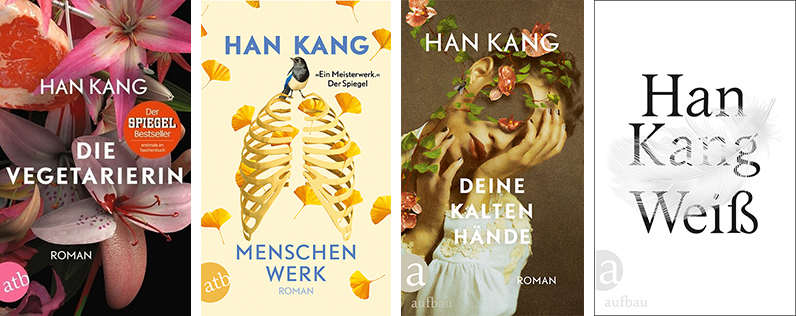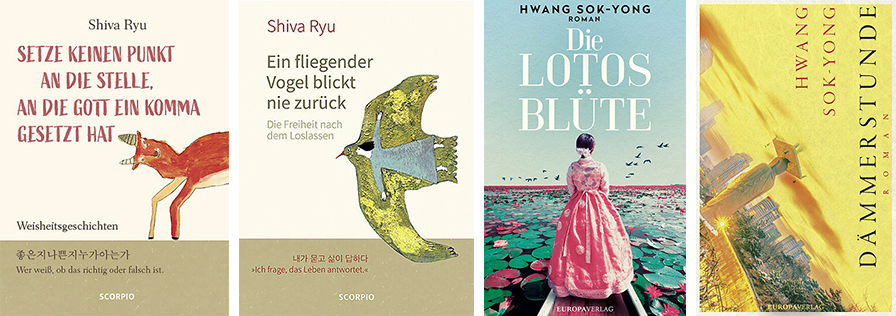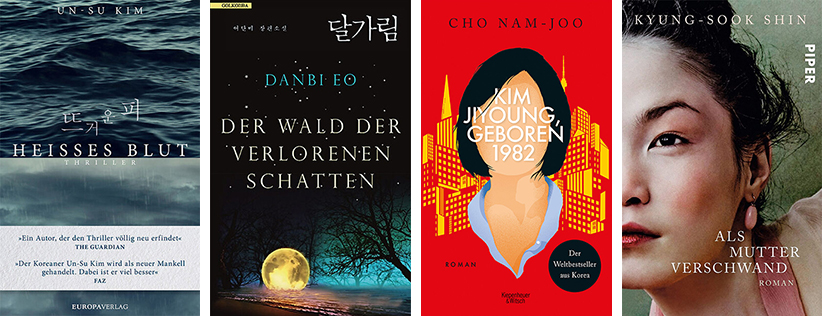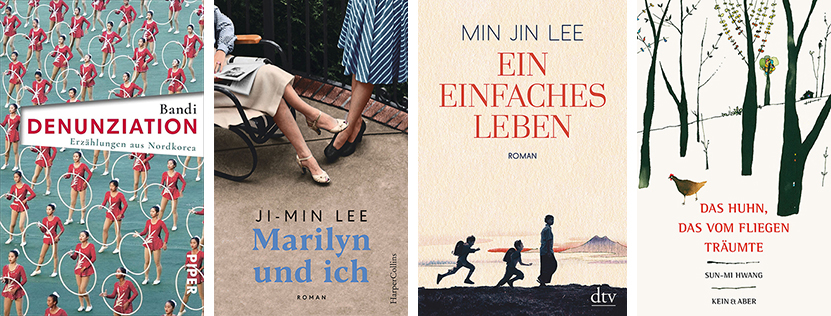K-pop and K-drama are hot in Germany as well. According to a news article released by Yonhap News Agency on February 9 this year, the number of freshmen choosing to study Korean Studies at the Free University of Berlin, Germany, increased from 25 in 2008 to 350 in 2021. Also, we are receiving almost 200 applicants for the Korean class open at the Language Center of the Technical University of Munich each semester where I’m teaching students. On top of these two cases, I can also recall the days where we struggled and worked so hard to find a publisher that would accept our first translated book in 1993. This is why the recent boom in Germany about Korean culture, including the language and literature, is more vivid to me.
Korean literature has been translated and published in Germany mainly with the support of the Daesan Foundation and the Literature Translation Institute of Korea. It received attention in 2005 when Korea was selected as the guest of honor at Frankfurt Book Fair and introduced about 100 titles, but it was short-lived. It is not an exaggeration to say that the immense interest in Korean literature of the German literary circle began with The Vegetarian (Changbi Publishers, Inc.), written by Han Kang in 2016. The book’s winning of the Man Booker International Prize brought about a huge sensation across Germany, which was not a common thing at all. Media outlets were eager to talk about the book as soon as its German edition was published, and even critics that had little understanding of Korean literature enthusiastically reviewed the book. It was the moment when Korean literature began to show its commercial potential, moving out of the shadow into the spotlight.

German edition of The Vegetarian, Human Acts, Your Cold Hands, The White Book
The Vegetarian had its literary value proved once again when it became a shortlist nominee for theinternational literary award (Der Internationale Literaturpreis – Haus der Kulturen der Welt, grants 35,000 EUR (about 45 million KRW)) in 2017 presented by the Haus der Kulturen der Welt (HKW, House of the Cultures of the World). As the venue for international cultural exchange for modern non-Europeans supported by the German government, the HKW selects one of the literary works translated into German and awards its writer and the translator as a team. The German publisher of The Vegetarian, Aufbau Verlag, has been introducing one of Han Kang’s works every year, including Human Acts (Changbi Publishers, Inc.), Your Cold Hands (Munji Books), and The White Book (Munhakdongne Publishing). And the German literary world’s interest in her and her books remains heated.
Before The Vegetarian made its debut in Germany, the German edition of Seven Years of Darkness (EunHaeng NaMu), a full-length fiction of Jeong You-Jeong, was chosen to be listed on the reading list of detective fictions announced by Die Zeit – a popular weekly newspaper in Germany, for the first time as Korean detective fiction. The publisher of the book, Unions in Switzerland, has been actively introducing world literature in Germany and has published other Korean books such as The Good Son (EunHaeng NaMu) of writer Jeong You-Jeong, Oh Jeong-Hee’s Bird (Munji Books), Lee Mun-Yeol’s Our Twisted Hero, and Lee Seung-Woo’s Private Life of Plants (Munhakdongne Publishing).

German edition of Seven Years of Darkness, The Good Son, Bird, Our Twisted Hero, Private Life of Plants
Writer Oh Jeong-Hee was the first Korean author to win the LiBeratur Award (liberaturpreis) in 2003 presented by Litprom, an organization that promotes literature from Asia, Africa, and South America. This literary award that awards one female writer each year was first presented in 1987 with an aim to promote Asian, African, and South American literature in Germany. Other works of Korean female writers have been nominated for the award after writer Oh Jeong-He. For example, Kim Ae-Ran’s My Palpitating Life (Changbi Publishers, Inc.) and Han Kang’s Human Acts were nominated in 2017, and Jeong You-Jeong’s The Good Son and Pyun Hye-Young’s The Hole (Munji Books) had the honor in 2020.
Starting with writer Jeong You-Jeong, Korean thriller writers have been making notable accomplishments in Germany for the past several years. Kim Un-Su’s The Plotters (Munhakdongne Publishing), which surprised the Korean literary circle for its hundreds of millions of won of contract fee in the United States, was published by Europa Verlag in Germany in 2018, after which it was added to the reading list of detective fiction by Die Zeit, drawing a positive reaction from many media outlets. Also, the publication rights of Suh Mi-Ae’s Good Night Mom (Elixir) were sold at 50 thousand euros in advance to publisher Heyne Verlag. Kim Young-Ha’s A Murderers’ Mnemonics (Munhakdongne Publishing) also received good reviews when it was published in 2020 by Cass Verlag. The head of the publisher, Cass, who majored in Japanese, said she decided to publish A Murderer’s Mnemonics in Germany when she read the first sentence of its Japanese edition at a booth installed by the Literature Translation Institute of Korea (LTI) at Frankfurt Book Fair. The book earned her the Hotlist Award in Germany that year.

German edition of My Palpitating Life, The Hole, The Plotters, Good Night Mom, A Murderer’s Mnemonics
Publisher Europa that owns a number of imprint brands, is the one that has been producing the greatest number of Korean literary works in Germany. For example, beginning with Haemin Sunim’s The Things You Can See Only When You Slow Down (Suo Books) in 2017, it has been showing much interest and love in Korean literature with other books of Haemin Sunim, including Love for Imperfect Things (Suo Books), Haemin Sunim’s Warm Cheer (Suo Books), and The Things That Shine Brighter When It’s Silence (Suo Books), not to mention Kim Un-Su’s The Boiling Blood (Munhakdongne Publishing), Ryu Shiva’s Good or Bad, Who Knows? (The Forest Book), Eo Dan-Bi’s Eclipse (CABINET), Hwang Suk Yeong’s Shim Chung, The Way of the Lotus (Munhakdongne Publishing) and Dusk (Munhakdongne Publishing), and Ryu Shiva’s Birds Don’t Look Back As They Fly (The Forest Book) scheduled to be published in fall this year.

German edition of The Things You Can See Only When You Slow Down, Love for Imperfect Things, Haemin Sunim’s Warm Cheer, The Things That Shine Brighter When It’s Silence

German edition of Good or Bad, Who Knows?, Birds Don’t Look Back As They Fly, Shim Chung, The Way of the Lotus, Dusk
If Han Kang’s The Vegetarian gave a fresh shock to the German literary world in 2016, Cho Nam Joo’s Kim Jiyoung, Born 1982 (Minumsa), followed in her footsteps in 2021. The book, which received focused attention from various media outlets when it was published in February, printed a whopping 35 thousand copies in only two months. This implies that the issues the book covers are universal and that not only Koreans but also German readers can relate to them.
Also, writer Shin Kyung-Sook’s Please Look After Mom (Changbi Publishers, Inc.) and North Korean writer Bandi’s The Accusation (Dasan Books) published by Piper Verlag in 2014, writer Lee Ji-Min’s The Starlet and the Spy: A Novel (That Book Co.) published by Harper Collins in 2020, Korean American writer Lee Min-Jin’s Pachinko (Grand Central Publishing), and writer Hwang Sun-Mi’s The Hen Who Dreamed She Could Fly (SAKYEJUL PUBLISHING LTD.) are still beloved as well.

German edition of The Boiling Blood, Eclipse, Kim Jiyoung, Born 1982, Please Look After Mom

German edition of The Accusation, The Starlet and the Spy: A Novel, Pachinko, The Hen Who Dreamed She Could Fly
When I began my career as a translator, it was almost impossible to find a Korean literary work that was translated into German. Therefore it is astonishing and fun to experience the advancement of Korean literature in the German literary world as a person who has been translating works into German for the past 20 years. I hope that more Korean literature is translated and meets more various German readers.
Written by Lee Ki-Hyang (Korean-German translator)













